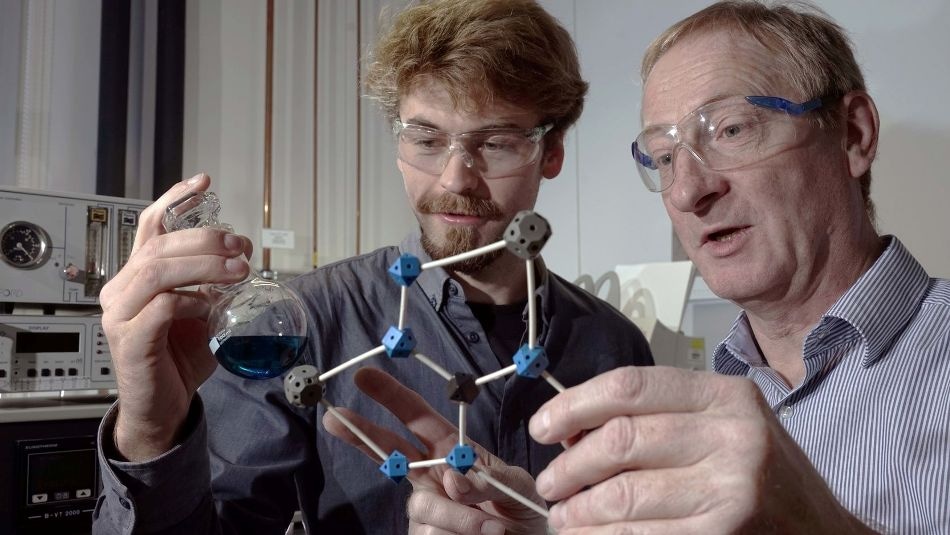Dec 12 2018
Quantum computers could considerably improve the capabilities of IT systems, giving rise to major changes across the globe. Yet, developing such a device in reality is still far off since it has not been possible, to date, to practically transfer prevalent molecular concepts into technologies.
 PhD student Benjamin Kintzel (Left) and Prof. Dr Winfried Plass discuss a molecule they have developed, that may possibly be used in a quantum computer. (Image credit: Friedrich Schiller University Jena)
PhD student Benjamin Kintzel (Left) and Prof. Dr Winfried Plass discuss a molecule they have developed, that may possibly be used in a quantum computer. (Image credit: Friedrich Schiller University Jena)
However, this has not prevented researchers across the world from developing and optimizing innovative concepts for individual components. At present, chemists at Friedrich Schiller University in Jena (Germany) have produced a molecule with the ability to perform the function of a computing unit in a quantum computer. They have described the study in the latest issue of the research journal Chemical Communications.
Molecule with sufficiently long-lived spin state
If a molecule has to be used as a qubit—the basic unit of information in a quantum computer—it must have an adequately long-lived spin state, which can be controlled from the outside, explained Prof. Dr Winfried Plass of the Jena University. That is, the state that arises as a result of the interacting spins of the electrons of the molecule, or the spin state, must be sufficiently stable for a user to enter and read out information. The molecule created by Plass and his colleagues fulfills precisely this condition.
This molecule is the so-called coordination compound, consisting of both organic and metallic parts. A frame is formed by the organic part, in which the metal ions are positioned in a very particular style, stated Benjamin Kintzel, who had a leading role in synthesizing the molecule. In this case, it is a trinuclear copper complex. The feature unique to it is that inside the molecule, the copper ions form a precise equilateral triangle. Only in this manner can the electron spins of the three copper nuclei interact so vigorously that the molecule develops a spin state, thereby making it a qubit that can be controlled from the outside.
According to Kintzel, although they were well aware of what their molecule should look like in theory, this synthesis is a huge challenge. Specifically, it is challenging to achieve the equilateral triangular positioning, as the molecule had to be crystallized to characterize it precisely. Moreover, it is difficult to predict the manner in which such a particle will behave in the crystal. Yet, the researchers were successful in achieving the intended result by using a number of different chemical tools and fine-tuning processes.
Addressing information with electric fields
Theoretical predictions suggest that the molecule synthesized in Jena provides an additional fundamental benefit compared to other qubits. The plan for theoretical construction of the copper compound enables its spin state to be controlled at the molecular level using electric fields, stated Plass. To date, magnetic fields have largely been used; however, this cannot be applied to focus on single molecules. A research team from Oxford, United Kingdom, which is collaborating with the chemists from Jena, is at present performing various experiments to analyze this property of the molecule created at the University of Jena.
The group of chemists in Jena is confident that the molecule meets the requirements for being used as a qubit. Yet, it is challenging to predict whether it will really have a future use as a computing unit. This is due to the fact that it is not yet definitely evident how molecules will actually be integrated into quantum computers. Moreover, chemical expertise is needed to accomplish this and the experts in Jena are ready to take up the task.